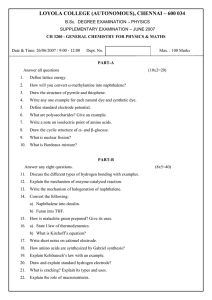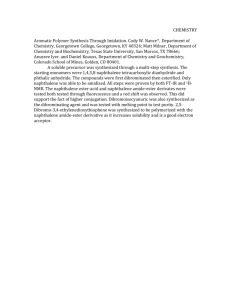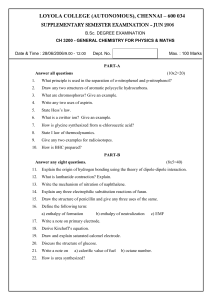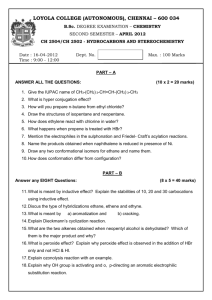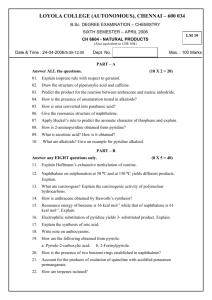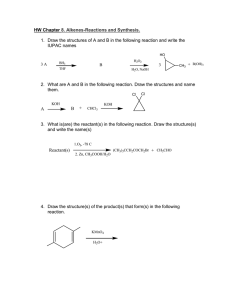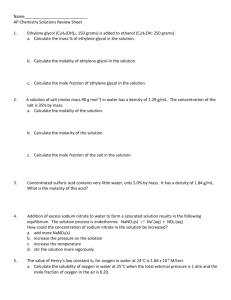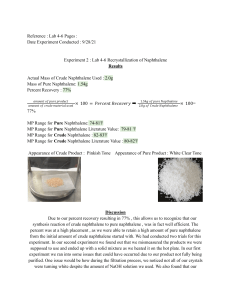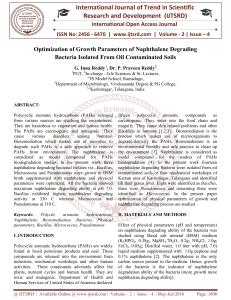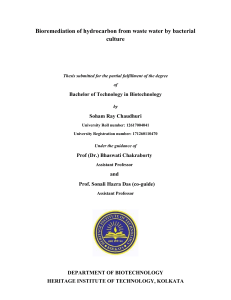LOYOLA COLLEGE (AUTONOMOUS), CHENNAI – 600 034
advertisement
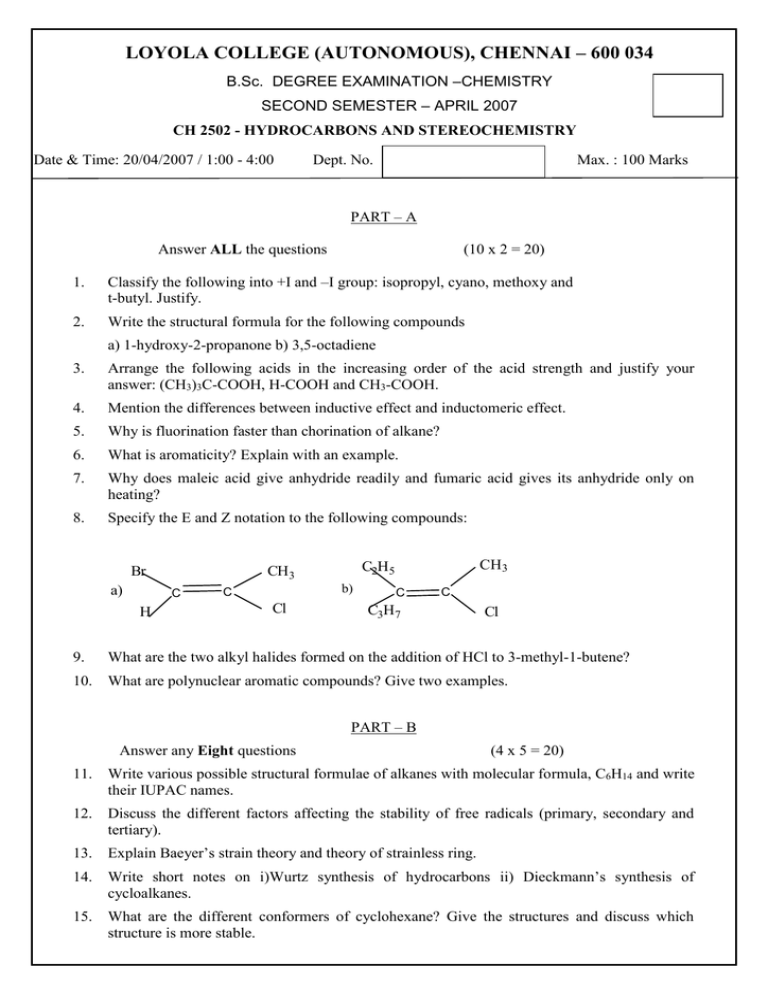
LOYOLA COLLEGE (AUTONOMOUS), CHENNAI – 600 034 B.Sc. DEGREE EXAMINATION –CHEMISTRY SECOND SEMESTER – APRIL 2007 CH 2502 - HYDROCARBONS AND STEREOCHEMISTRY Date & Time: 20/04/2007 / 1:00 - 4:00 Dept. No. Max. : 100 Marks PART – A Answer ALL the questions (10 x 2 = 20) 1. Classify the following into +I and –I group: isopropyl, cyano, methoxy and t-butyl. Justify. 2. Write the structural formula for the following compounds a) 1-hydroxy-2-propanone b) 3,5-octadiene 3. Arrange the following acids in the increasing order of the acid strength and justify your answer: (CH3)3C-COOH, H-COOH and CH3-COOH. 4. Mention the differences between inductive effect and inductomeric effect. 5. Why is fluorination faster than chorination of alkane? 6. What is aromaticity? Explain with an example. 7. Why does maleic acid give anhydride readily and fumaric acid gives its anhydride only on heating? 8. Specify the E and Z notation to the following compounds: Br a) C H b) C Cl CH3 C2H5 CH3 C C C3H7 Cl 9. What are the two alkyl halides formed on the addition of HCl to 3-methyl-1-butene? 10. What are polynuclear aromatic compounds? Give two examples. PART – B Answer any Eight questions (4 x 5 = 20) 11. Write various possible structural formulae of alkanes with molecular formula, C6H14 and write their IUPAC names. 12. Discuss the different factors affecting the stability of free radicals (primary, secondary and tertiary). 13. Explain Baeyer’s strain theory and theory of strainless ring. 14. Write short notes on i)Wurtz synthesis of hydrocarbons ii) Dieckmann’s synthesis of cycloalkanes. 15. What are the different conformers of cyclohexane? Give the structures and discuss which structure is more stable. 16. How is ethylene prepared in the laboratory? How does it react with i)bromine water ii) Con.H2SO4 iii) HCl iv) acidified KMnO4 v) hypochlorous acid vi) ozone 17. Explain the mechanism of electrophilic substitution of (i) Friedal-Crafts sulphonation of benzene. 18. What is tautomerism? Explain keto-enol tautomerism in detail. 19. Why carboxyl group is meta orienting and carboxylate ion is ortho and para directing? 20. How will you prepare the following: (i) n-propanol from propene 21. Explain the mechanism of markownikoff and antimarkownikoff addition of propene. 22. Write the structure of the product in the reaction of (ii) Glycol from ethylene. Naphthalene H2/Ni Naphthalene con.H2SO4/HgSO4 2-pentyne Alkaline. KMnO4 2-butyne Naphthalene acylation (ii) O3/hydrolysis CH2O+HCl PART – C Answer any FOUR questions (4 x 10 = 40) 23. Explain the mode of hybridization of carbon in methane, ethylene and acetylene. Explain why aliphatic amines are more basic than aromatic amines. 24. Explain the mechanism of halogenation of alkanes and what are the factors affecting the rate of the reaction. 25. a) Why does the electrophilic substitution reaction of naphthalene take place in the carbon1(α) rather than on carbon 2 (β) b) Explain the 1,4- and 1,2- addition reactions of dien in detail. 26. On reduction of compound C6H10(A) gives first C6H12(B) and finally C6H14(C). On ozonolysis followed by reduction (A) gives two aldehydes C2H4O (D) and C2H2O2 (E). Oxidation of B with acidified potassium permanganate gives the acid C3H6O2(F), Identify the compounds A to F and express the various reactions involved by means of equations. 27. a) What is orientation effect? Explain with examples. b) Write short notes on i)Diels – Alder reaction ii) Hydroboration reaction. 28. Write the Newman projection formulae of comparatively stable conformation of butane. Which one of them is preferred conformation? ****** 2
